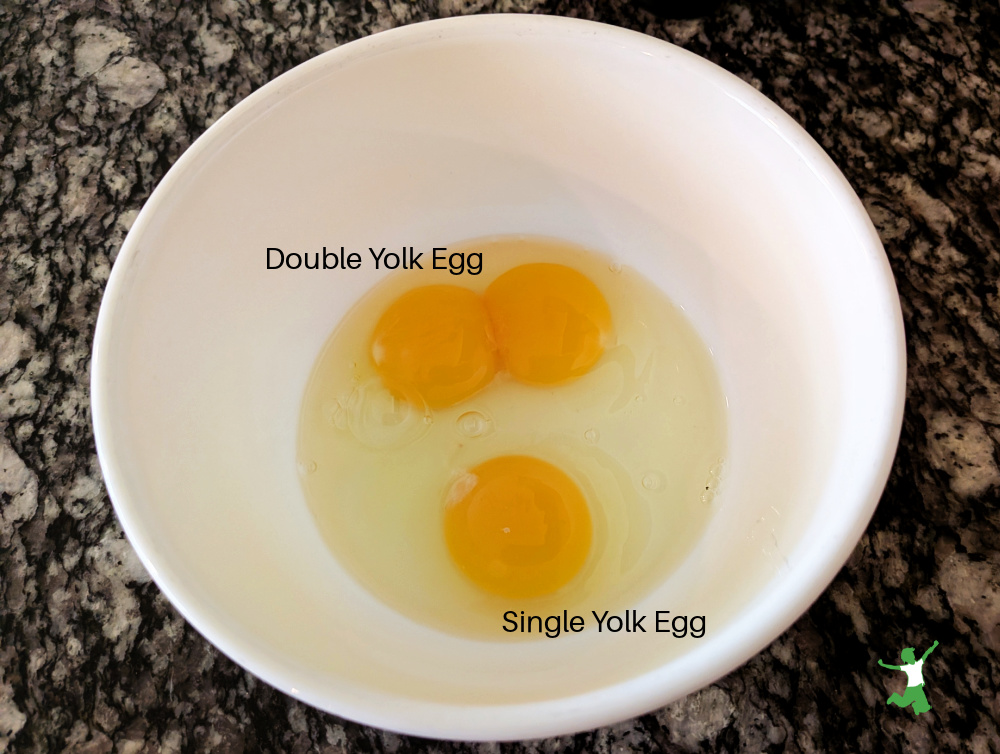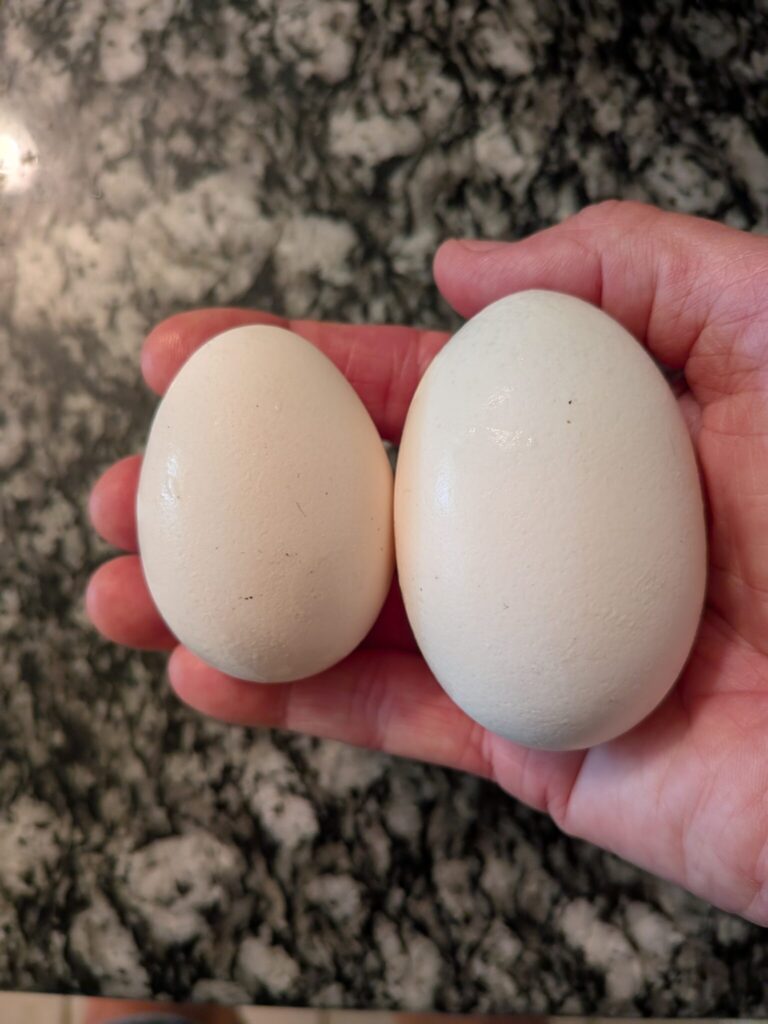The amazing phenomenon of double yolk eggs, how they compare to single yolk store eggs, and tips on getting more of these beauties from your hens!

One of the biggest benefits of keeping backyard chickens is that you get to enjoy eggs that you would rarely (if ever) come across buying organic store eggs.
Eggs you generally don’t see in cartons from the store are what’s called “double yolkers”. They are roughly the size of duck eggs!
Another example is eggs with “meat spots”.
Below is a picture of a double yolk egg that one of my newly laying White Leghorn hens gifted us recently.
Note the size of the double yolker compared to a single yolk egg.
These two eggs were laid by the same young hen!
I really hit the jackpot with this sweet bird ❤️
As you can see from the picture above, each yolk in the double egg is roughly the same size as the yolk in the single egg.
Since the yolk is the most nutritious part of an egg (can you believe some folks still throw them out?), you really do get “two for the price of one”.

While I am fortunate to have a hen that is only six months old laying double yolkers, these beauties typically come from older hens.
This is why you don’t see double yolk eggs in the store from industrialized farms even if organically certified.
Hens from mass production farms are normally culled for meat after only a year or so….as soon as their egg production starts to drop or their first molt, whichever comes first, according to what I’ve been told by those in the industry.
The commercial egg industry also prefers eggs from young hens (under a year and a half old) as this ensures uniformity of size for packing/shipping in egg cartons.
Eggs get larger in size with the age of the hen in my experience. Hence, the propensity for double yolk eggs from older birds.
If you’ve never seen double yolk eggs before, why not?
Are you still supporting the industrial food complex by purchasing eggs at the store?
Note that store eggs, even if organic, may be weeks old (or months old if partially frozen in storage) by the time you buy them. In addition, they are washed with undesirable chemicals as this is required in the United States.
Because eggshells are porous, some of this is no doubt getting into the eggs!
Read more details about the scam of organic store eggs and organic egg washing practices at the provided links.
Contrary to popular belief, a nutritious egg is not all about the yolk color, because this can easily be manipulated with feed to fool the consumer if the hens aren’t truly pastured.
I recommend getting your eggs from one of the sources below to ensure legit yolk color and to avoid the toxic practices that are allowed under USDA Organic for mass production facilities.
- Your own backyard coop (best)
- A neighbor
- Farmer’s market
- Independently owned health food stores that source from local egg farms.
You don’t need any double blind studies to see and taste the difference.
Your five senses will do just fine, thank you!








“You don’t need any double blind studies to see and taste the difference.”
True that! Thats why are society is wasting away in poor health, they’ve been too brainwashed by mainstream pseudo-science! Trust nature, not chemicals.
Those look yummy! And while I know farm fresh eggs are better, they are definitely not cheaper around here. But I still buy them because I know how much better they are for me and my family. One day we hope to have laying hens, but that’s not going to work right now with a new baby due in a month.
Yes! Our farm fresh eggs had 2 double yolked eggs in one dozen last week. It really is no comparison on quality.
I don’t know much about chicken raising, but I’m interested to learn more. One thing that has dawned on me since joining the Real Food Movement is how far we are removed from our food source! I mean, duh, I know eggs come from chickens, but other than that… not much. I’m pretty sure we eat unfertilized eggs, right? So how does a double yolk happen? Wouldn’t that be twinning? Can an egg split into a twin without being fertilized? I guess since having identical twin girls myself, I’m more interested in twinning! Looks like I need to do some more research to satisfy my curiosity!
By the way, when I was growing up, a double yolk for breakfast always meant you were going to have a lucky day.
Last year I got a full dozen double yolk eggs. I loved every single bite! And I keep hoping for more! 🙂
I’ve never bought a lottery ticket in my entire life. However, if I got 3 double yolk eggs in row I’d be buying a ticket. 🙂
I agree! 🙂
I just recently had a carton of eggs in which 3/4 were double-yolked. Now the interesting thing about this was that while they were locally-produced, they are from a brand of eggs that are widely available in our state. They do tend to have yellow-orange yolks, but nothing like the orange yolks I once got from a friend’s fully-pastured eggs.
The other interesting thing about these eggs is that they were Jumbo eggs. I’ve never purchased Jumbo eggs before — but we eat so many, and they were the same price as the Large ones, I thought, “Why not?” My sister’s theory is that the Jumbo eggs are just frequently twins.
So, sorry, I’m not sure how my eggs fit into the industrial food complex (while they are local, it’s a large producer), but I am not sure that double-yolks are necessarily indicative of high egg quality. They are the more expensive eggs at the regular grocery store, and are available at all the health food stores, too, sold as “Free Range.”
I’m interested to know what you consider a large producer? By the way, it’s easy to fake out the customer with orange yolks .. just mix a bit of beta carotene in the chicken feed. The only real way to tell if the eggs are good is the strength of the shell, in my experience. If the shell is strong AND the yolks are orange, you’ve got yourself a good egg. Double yolks, are, of course, a bonus.
http://www.nestfresh.com/
We have some chicken raising experience – 3 years of raising backyard chickens. My experience is that the double yolks only came during the first half a year or so of our chickens starting to lay. Our neighbor also sells eggs and his double yolks come during that first year. We haven’t had a double yolk from our own chickens since those first months they layed. Seems like it’s just a fluke of the chicken getting the whole “system” worked out as they start to lay. The double yolks will also only be in those jumbo eggs, which is why you most likely never got one from the grocery store.
Also the shells of young layers are much harder than older hens. As our first hens neared 3 years old we noticed a big difference in the shells, as well as the whites being much runnier. The chickens were just getting older. They were still free ranged and fed the same feed.
Our free range yolks are bright orange, much oranger than our neighbor’s totally enclosed chickens. My daughter just got a double yolk today from the neighbor eggs and brought up the subject about them being twins and how that would work. Fun!
I love double yolks! Our chickens have finally started laying enough where we’ve been able to rely solely on our own eggs. Double yolks are always a treat. Twice the nutrition is never a problem in my book. 😉
That’s why I actually returned a bunch of store-bought eggs today. I can’t wait to get my 5 dozen next Tuesday, Sarah. Now whenever I do buy eggs from the store (which is sporadic b/c of poor planning), I pity myself.
I buy our eggs directly from our dairy farmer, an Amish man who uses a lot of the same methods as Joel Salatin (including using the chickens to clean up after the cows). Best eggs ever. Just once, last year, I got an ENTIRE DOZEN double-yolkers. I’d love to have that happen again..
Oh, that is so cool!